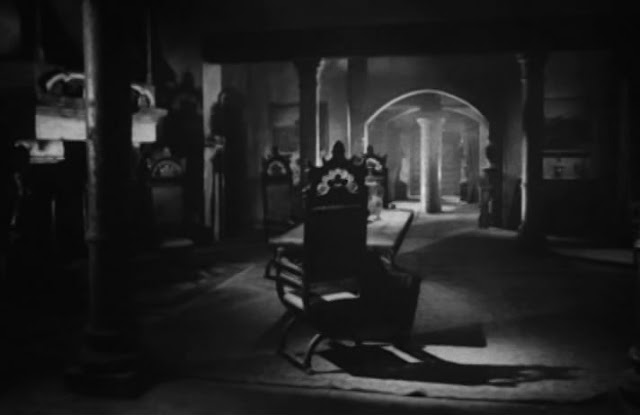As I write this, the 83rd Academy Awards ceremony - better known to you and I as the Oscars - is about to begin. I think it is in keeping with the delirious ethos of this blog that the film up for discussion tonight is about as far from Oscar material as it is possible to get (without being porn): an Italian exploitation horror movie.
Italian cinema was notorious for trying various means to exploit the success of recent films or trends. The producers might name their film to make it appear to be the sequel to something when in actual fact it has no relation to the original; a good example is Lucio Fulci's gore classic ZOMBI 2 (1979) - marketed as a sequel to George Romero's DAWN OF THE DEAD (1978), which was called ZOMBI in Italy. The film-makers might take the plot of a successful movie, alter one or two elements and jump right on to the bandwagon; an example of this is Ovidio G. Assonitis' TENTACLES (1977), which is essentially JAWS (1975) with a giant octopus. More brazenly still, the film-makers might just opt for a total rip-off, like Enzo G. Castellari's THE LAST SHARK (1981). In fact, this last example was such a brazen act of theft that Universal sued, and won.
CASTLE OF BLOOD or, to use its original title, DANZA MACABRA (or DANSE MACABRE in my French DVD release version), was directed by Italian genre stalwart Antonio Margheriti in 1964. It purports to be based on a story by Edgar Allan Poe but is no such thing; the Poe angle is merely a ruse to attempt to cash in on the popularity of the Poe adaptations made by Roger Corman, as discussed in earlier posts. True, the film starts with Poe (Silvano Tranquilli) relating one of his stories to travellers at an inn but what follows has nothing to do with the great man.
Another ruse employed by Italian film-makers was to try to disguise the origins of their film, cast and crew in the knowledge that foreign films were often a hard sell to British and particularly American audiences. This didn't just happen to knock-off horror movies but to stone cold classics as well: American audiences would have seen the credits of A FISTFUL OF DOLLARS name the director as 'Bob Robertson' and Ramon as being played by 'Johnny Wels'. One thing that always strikes me about these phoney names for English-speaking markets is that they always sound phoney: they sound like exactly what they are - names made up by people for whom English isn't their first language. So in this film we get the improbable sounding actors 'Henry Kruger', 'Phil Karson', 'Ben Steffen' and my personal favourite 'Montgomery Gleen'.
Once we get all that Poe scene-settery out of the way, the plot is hoary but a good one. Our hero, Alan Foster (played with limited range by George Riviere), a journalist who had arrived to interview Poe, accepts a wager from Lord Blackwood that he cannot spend a single night in the deserted but reputedly haunted Castle Blackwood. Once he arrives, he finds the castle is not as deserted as he had been led to believe. There is a great and lengthy sequence showing Foster making his way into the castle through a passage lit only by his flaming torch.
Whatever Italian genre movies may lack in originality, and however cynical you might think their methods, they are usually great in purely visual terms. Mario Bava was the daddy of this: some of his black-and-white films are genuinely brilliant visually. Antonio Margheriti doesn't quite have Bava's flair but he still has a good eye for a composition and the camerawork is terrific. Some of the shots are almost Expressionistic and bear comparison with Gregg Toland's work on CITIZEN KANE (1941).
The other trump card that Italian genre movies have is that, perhaps because of their unoriginality, they were prepared to go further than their British or American counterparts in depicting scenes of sex and violence. There is a brief topless scene in this movie that would have been unthinkable in a Hammer production of the same year.
I can't discuss this film without mentioning Barbara Steele. As I've posted before, Steele is an icon of the genre and was something of a muse for Italian directors in the 1960s. Few, if any, actresses before or since have personified the idea of unearthly passion as Steele did.






No comments:
Post a Comment